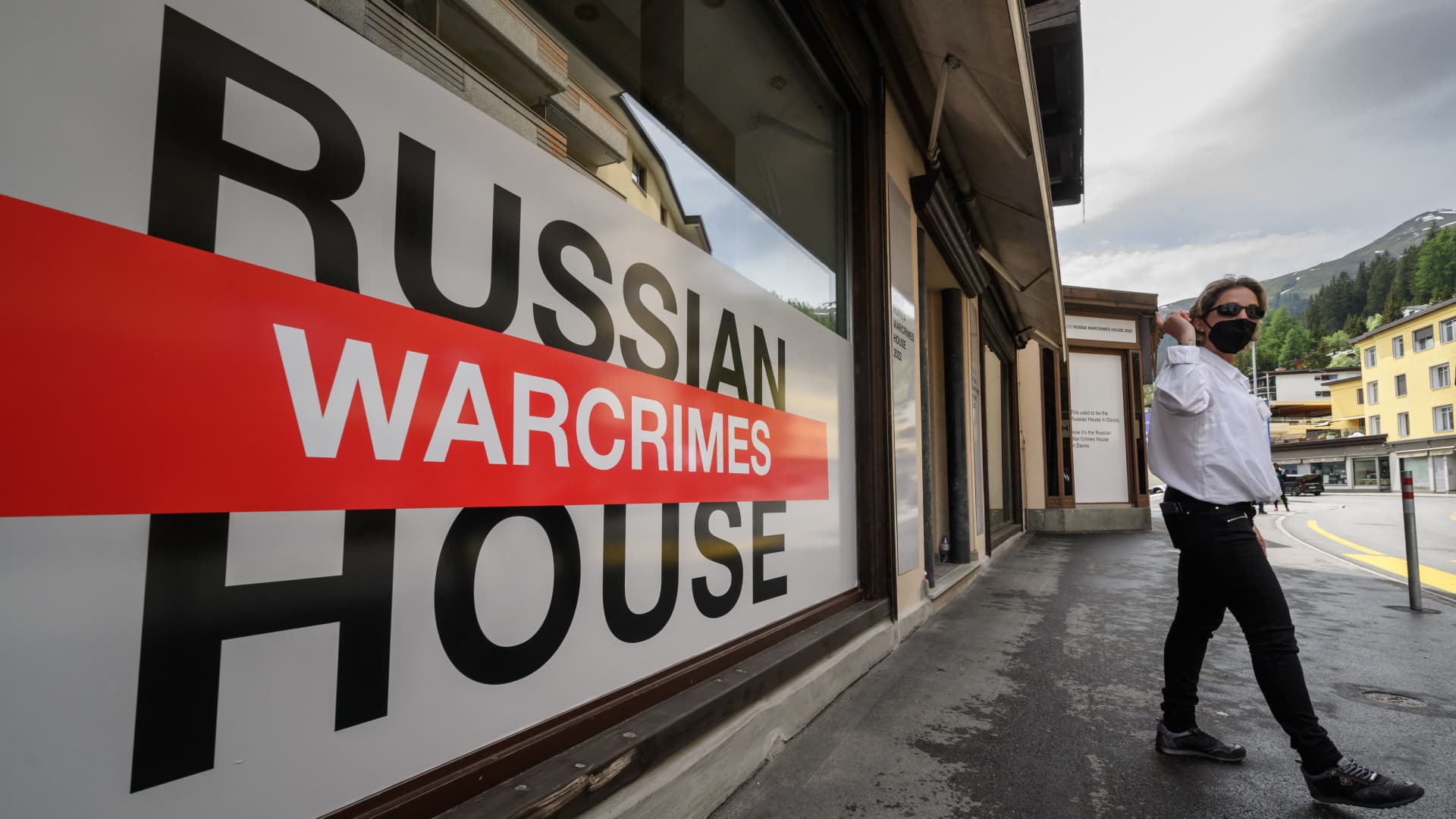
DAVOS, Switzerland — The war in Ukraine is top of the agenda at the World Economic Forum in Davos this week, with a keynote address from President Volodymyr Zelenskyy and several prominent politicians calling for more action from the West.
A couple of minutes walk from the main WEF Congress Center is the former Russia House, where Russian businessmen and politicians used to host meetings and networking events in previous years. But the World Economic Forum has barred them from taking part at this year’s event following Moscow’s unprovoked invasion of its neighbor.
In its place is now an art exhibition that focuses on war crimes committed by the Russian military, using data from Ukraine’s law enforcement agencies and human rights group Amnesty International.
“Russia for years came here to Davos to present itself in the way it believed it should show itself to the world … but representing Russia in the way it really is, I think it is very important. That’s what we are doing here,” Bjorn Geldhof, the artistic director for Kyiv-based PinchukArtCentre and curator of the exhibition, told CNBC.
“We are representing war crimes that Russia is committing in Ukraine, but war crimes that were also committed in Chechnya, that were also committed in Syria — so what we are showing is the reality from Russia that most people don’t speak about,” he said.
There are about a dozen or so photos on display for Davos attendees, portraying wounded civilians and destroyed buildings. There are mounting allegations of war crimes committed by Russian forces in the country, some of which have been documented by international organizations such as Human Rights Watch.
Russia has repeatedly denied allegations of war crimes and says it does not target civilians, despite overwhelming evidence to the contrary.
“The Davos crowd is not used to this type of reality … But they are incredibly sensitive to it, I think people start realizing what’s really happening in Ukraine, they start realizing how horrifying Russia’s atrocities are on the ground,” Geldhof said.
Two Ukrainian women, who have volunteered to help their army but were in attendance at Davos, said the exhibition doesn’t show anything new to them. “We are used to this,” 36-year-old Lana, wearing her military uniform, told CNBC.
She, together with her friend Ulyana, are in Davos “to find some people who want to help Ukraine.” “We have little time [left],” Lana said.
The conflict has now entered its fourth month, with Kyiv asking western nations for more heavy weapons to address the fighting in the eastern part of the country. The latest reports suggest that 38 towns were hit in the Luhansk and Donetsk areas on Monday.
Olly, a 35-year-old Ukrainian man, is also in Davos to draw attention to what’s happening in his home country.
“Ukraine should stay on the agenda until the conflict is resolved. If Russia takes over Ukraine it would be a bad signal … it is a bad signal for the whole world,” he said. Olly is currently living in Turkey with his parents, but his dream is to return home.
“I love my country,” he said. When asked what European leaders could do to support Kyiv further, he said: “ammunition.”
Zelenskyy speech
The words from the three Ukrainians follow a speech President Volodymyr Zelenskyy gave to the Davos elite on Monday via videolink.
Zelenskyy said he is grateful for the support received thus far, but urged more action such as forcing Moscow to help rebuild Ukraine. “I invite you to take part in this rebuilding, the amount work is enormous, we have more than half trillion dollars losses … we need to rebuild entire cities and industry,” he said.
The Ukrainian president suggested that if Western economies had sanctioned Russia more effectively back in 2014, in the wake of Moscow’s illegal annexation of Crimea, then Ukraine would not be fighting this war now.
Reacting to the speech among the Davos crowd in the main Congress Hall, one attendee, who did not want to be named due to the sensitive nature of the situation, said Zelenskyy could not afford to upset the WEF gathering as private companies could play a critical role in the reconstruction of Ukraine.
Another attendee, Arshdeep Sethi, a senior managing director at real estate firm RMZ corp, said he appreciated Zelenskyy’s focus on practical solutions to the reconstruction. “He knows [the] damage is done and that more capital is now needed,” he said.




